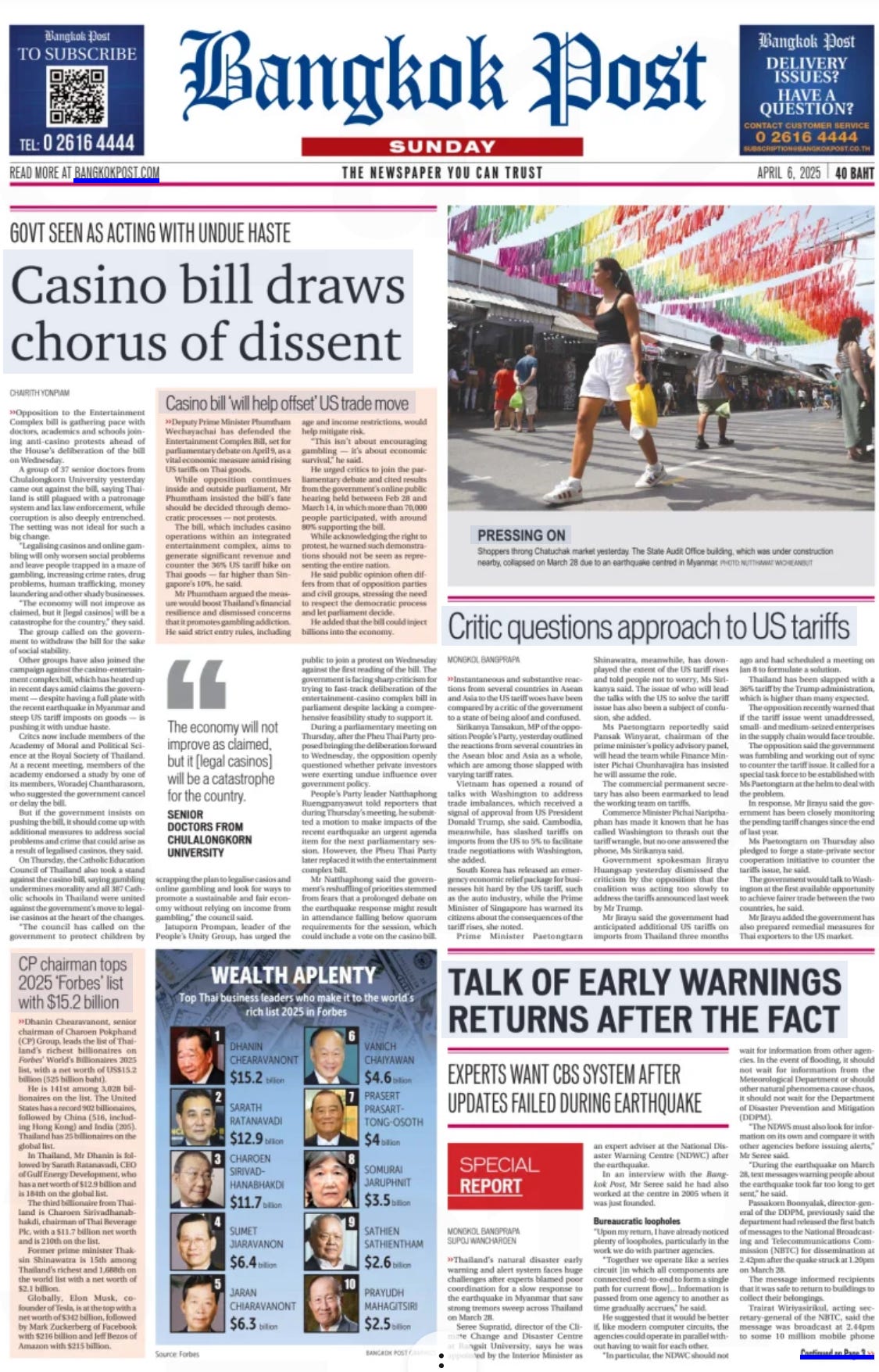The World's Not Okay - Singapore Says it Out Loud
Singapore PM says the era of global economic stability is over: the diplomatic equivalent of a five-alarm fire
In a tone reminiscent of the early days of the Covid-19 pandemic, Singaporean leaders - among America’s closest allies in Asia - are sounding the alarm over the potential fallout from Donald Trump’s “reciprocal” tariffs. Led by Prime Minister Lawrence Wong, officials are warning citizens to prepare for significant financial pain, citing concerns that sweeping tariffs on imports could disrupt global supply chains and hit export-driven economies like Singapore especially. The message is clear: the ear of global economic stability is over, and the ripple effects of U.S. political decisions are already being felt far beyond its borders.
Mr. Wong said Singapore, which was hit by the lower tier tariffs of 10 percent will, for now, not impose retaliatory tariffs on the U.S. (However, other Asian nations such as Thailand and Vietnam are already reaching to concluded their own bilateral deals with the Trump team). Mr. Wong said Singapore will benefit from its large reserves, and “cohesiveness and resolve.” Here’s what Mr. Wong had to say:
The recent Liberation Day announcement by the U.S. leaves no room for doubt. It marks a seismic change in the global order. We are entering a new phase. One that is more arbitrary, protectionist and dangerous. For decades the U.S. was the bedrock for the free market economies of the world, and let efforts to build a multilateral trading system…
What the U.S. is doing now is not reform. It is abandoning the entire system it had created. Its new approach of reciprocal tariffs, country by country, is a complete rejection of the WTO framework….
The likelihood of a full-blown global trade war is growing…
Singapore will take a bigger hot than others, because of our heavy reliance on trade. The last time the world experienced something like this was in the 1930s. Trade wars escalated into armed conflict - and eventually the Second World War. Now one can say how the current situation will unfold in the coming months or years. But we must be clear-eyed about the dangers that are building up in the world. Global institutions are getting weaker. International norms are eroding….
We must brace ourselves for more shocks to come…The risks are real and the stakes are high.
Comment: Having interviewed the founder of modern Singapore, Lee Kuan Yew, more than any other foreign correspondent, I know the island nation well. When Mr. Wong and his ministers speak with this level of urgency, its the diplomatic equivalent of a five-alarm fire. His sentiment aligns with earlier remarks by former Prime Minister Lee Hsien Loong, who warned in 2023 that any clash between the U.S. and China would have grievous consequences for the world. Take it from me: the Singaporeans know China - and the wider region - extremely well. Their assessment needs to be taken seriously.

Rain is compounding misery and presenting new hurdles for relief efforts on Sunday in Myanmar, where state media reported the death toll from a devastating earthquake has risen to nearly 3,500 people. The 7.7-magnitude quake struck on March 28, razing buildings, cutting off power and destroying bridges and roads across the country. Damage has been particularly severe in the city of Sagaing near the epicentre, as well as in Mandalay, Myanmar's second city and home to more than 1.7 million people. State media in the military junta-led country now say that the earthquake has caused 3,471 confirmed deaths and injured 4,671 people, while 214 remain missing. The UN said Friday that since the earthquake, the junta continued to conduct dozens of attacks against rebel groups, including at least 16 since Wednesday when the military government announced a temporary ceasefire - Bangkok Post
President Trump’s abrupt firing of the head of the National Security Agency and U.S. Cyber Command on Thursday was the latest in a series of moves that have torn away at the country’s cyberdefenses - just as they are confronting the most sophisticated and sustained attacks in the nation’s history. The commander, General Timothy D. Haugh, had sat atop the enormous infrastructure of American cyberdefenses until his removal, apparently under pressure from the far-right Trump loyalist Laura Loomer. He had been among the American officials most deeply involved in pushing back on Russia, dating to his work countering Moscow’s interference in the 2016 election. His dismissal came after weeks in which the Trump administration swept away nearly all of the government’s election-related cyberdefenses beyond the secure N.S.A. command centers at Fort Meade, Md. At the same time, the administration has shrunk much of the nation’s complex early-warning system for cyberattacks, a web through which tech firms work with the F.B.I. and intelligence agencies to protect the power grid, pipelines and telecommunications networks. Cybersecurity experts, election officials and lawmakers — mostly Democrats but a few Republicans — have begun to raise alarms that the United States is knocking down a system that, while still full of holes, has taken a decade to build. It has pushed out some of its most experienced cyberdefenders and fired younger talent brought in to design defenses against a wave of ransomware, Chinese intrusions and vulnerabilities created by artificial intelligence. “At a time when the United States is facing unprecedented cyberthreats — as the Salt Typhoon cyberattack from China has so clearly underscored — how does firing him make Americans any safer?” Senator Mark Warner of Virginia, the top Democrat on the Senate Intelligence Committee, said on Thursday night after General Haugh’s ouster. Mr. Warner was referring to an operation in which Chinese intelligence bored so deeply into American telecommunications networks that it had access to the Justice Department’s system for lawful interception of calls or text messages and could listen in on some conversations, including Mr. Trump’s during his campaign last year - NYT
More than 100 chemical weapons sites are suspected to remain in Syria, left behind after the fall of the longtime president, Bashar al-Assad, according to the leading international organization that tracks these weapons. That number is the first estimate of its kind as the group, the Organization for the Prohibition of Chemical Weapons, seeks to enter Syria to assess what remains of Mr. al-Assad’s notorious military program. The figure is far higher than any that Mr. al-Assad has ever acknowledged. The sites are suspected to have been involved in the research, manufacturing and storage of chemical weapons. Mr. al-Assad used weapons like sarin and chlorine gas against rebel fighters and Syrian civilians during more than a decade of civil war. The number of sites, and whether they are secured, has been a mystery since rebels toppled Mr. al-Assad last year. Now, the chemicals represent a major test for the caretaker government, which is led by the group Hayat Tahrir al-Sham. The group is designated as a terrorist organization by the United States, but it has renounced its links to Al Qaeda - NYT
Less than 48 hours after pounding Ukrainian President Volodymyr Zelensky’s hometown of Kryvij Rih, Russia released a missile and drone barrage - targeting Kyiv and Kharkiv especially. The capital’s mayor said early this morning that there were fires in the areas of the city and that a business center was partially demolished. Poland said it activated it defense systems and deployed fighter jets as Russian strikes reached close to Ukraine’s western border.
Russia’s war in Ukraine is taking a “poisonous” toll on the country’s soil, air wand water. According to experts cited by The New York Times, damage from artillery shells, mines, drones and missiles will endure for decades. It will degrade industries like farming and mining, introduce health risks and erode natural beauty. Fields are pocked with shell craters, their soil contaminated with the residue of explosives. Burning fuel tanks spew pollution into the air and wildfires burn unchecked in combat zones. Water from reservoirs has poured through destroyed dams, causing droughts upstream and damaging floods below. As the war enters its fourth year, Ukrainian authorities are collecting evidence of a new type of war crime known as ecocide. Prosecutors are pursuing 247 cases of environmental war crimes against Russia.
A top U.S. General, Christopher Cavoli, testified to the Senate Armed Services Committee that Russia is on track to produce 250,000 artillery shells per month, which would give it a stockpile three times larger than the combined artillery reserves of the US and Europe. The US currently produces 40,000 shells per month, with plans to increase this to 90,000 by 2026. The EU aims to reach a production of 167,000 shells per month by the end of 2025. Cavoli also warned that despite significant battlefield losses in Ukraine, Russia is rapidly replenishing its military strength. He emphasized that Russia is replacing not only its artillery but also tanks, armoured vehicles, and troops at a much faster pace than anticipated. Russia is expected to produce 1,500 tanks annually, while the US produces only 135. In the past year, Russia has lost an estimated 3,000 tanks, 9,000 armoured vehicles, 13,000 artillery systems, and over 400 air defense systems but is on track to replace them all - Business Insider
Russian sensors suspected of attempting to spy on the UK’s nuclear submarines have been found hidden in the seas around Britain. The discovery by the military has been deemed a potential threat to national security and has not been made previously public. Several devices were found after they washed ashore, but others are understood to have been located by the Royal Navy’s minehunter ships. The devices are believed to have been planted by Moscow to try to gather intelligence on the four Vanguard submarines, which carry nuclear missiles. As part of a Sunday Times investigation, it was found that the UK has discovered Russian unmanned underwater vehicles near deep-sea communication cables. The Ministry of Defence has also uncovered credible intelligence that superyachts owned by Russian oligarchs may have been used for underwater reconnaissance - The Sunday Times
Donald Trump risks making a “historical mistake” if his negotiations to end the war in Ukraine result in the US recognising Russia’s claims to Crimea and other occupied territory, says the Polish government’s adviser on Ukraine. Paweł Kowal, who advises Prime Minister Donald Tusk on Ukraine and heads the Polish parliament’s foreign affairs committee, said in an interview that a “red line” would be crossed for Poland and the rest of central Europe if expanded Russian borders were legally recognised as a result of the invasion of a neighbouring country. Kowal was speaking before flying to Washington on Sunday to meet senior members of the US Congress and Keith Kellogg, President Trump’s special envoy on Ukraine. There was a clear difference, Kowal said, between “provisional solutions” to end the fighting in Ukraine and the fulfilment of “Russian expectations to recognise Crimea, Donbas or other parts of Ukraine, which would be a historical mistake”. In terms of the precedent this would set enabling Putin to expand “imperial Russia”, Kowal warned, “it would be horrible”. - FT







Yes it's so chee bai lah according to local Singaporean slang